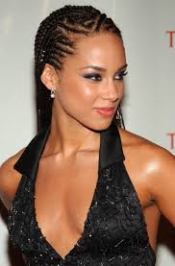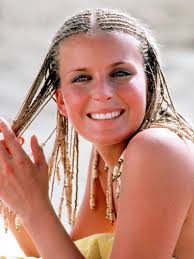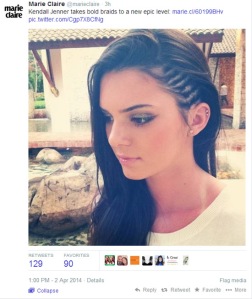If you haven’t heard about the recent beef between the most widely known natural hair site Curly Nikki and Ebony Online, then you must have been living under a rock. It all started when a White woman was featured on Curly Nikki sharing her hair journey and natural hair struggles. Some were confused as to why a White woman was included in a movement that has been mainly dominated by Black women. In reaction, Jamilah Lemieux, wrote the article, White Women on #TeamNatural? No, Thanks!, arguing against the inclusion of White women in the natural hair movement by citing cultural misappropriation and sacred “Black Girl Space.” Curly Nikki’s response was that she created the site for all women who are struggling with their natural hair texture, including White women.
I read both pieces and feel that both have their valid points. I respect Curly Nikki’s stance on this issue and her right to create an online space for all women and I also can identify with the concerns raised by Lemieux.
What I know most about are my personal experiences as a woman of color in this world. Particularly, my professional experience in social justice movements have shown me firsthand what happens when there are no spaces for individuals who experience unique circumstances. I will give a brief history. In the violence against women movement, Black women and White women originally worked separately in their own neighborhoods and families to protect each other against the violence in their homes and in their communities. After the women’s movement became integrated, it quickly became clear that the unique experiences Black women faced were not a major concern for their White allies. Eventually, Black women and their specific circumstances, were essentially pushed out of the violence against women movement. Today, if you walk into any mainstream domestic violence program or rape crisis center, you will see a number of White female employees and very little, if any at all, women of color on staff (other than culturally specific services, which are rare).
So, what happens when you are a women of color on staff at one of these mainstream social justice programs? One of the ways women of color are supported is through the availability of Women of Color Caucuses. These caucuses provide a safe, private space for women of color to discuss the concerns of their communities and their unique challenges within the movement. The caucuses address the need for rejuvenation, and sisterhood among women of color. They are a place to celebrate ourselves without having to explain why, because we have a shared experience.
The need for private space is not only necessary for our safety and sanity, it also protects our intellectual genius. Our culture has been adopted many times, especially when it comes to hairstyles. In 1979, the movie 10 was released and featured Bo Derek (a White woman) wearing cornrows in her hair. After the movie, she was named the most beautiful woman in the world, and cornrows came to be known as “Bo Braids” even though Black women had been wearing them for years including Roberta Flack and Cecily Tyson. Recently, Marie Claire tweeted a photo of Kendall Jenner with braids in her hair calling them “new” and “epic.” It ignited a firestorm of backlash on Twitter. Since when are 6 cornrows on the side of your head “epic?” When Alicia Keys wore braids for the first half of her career, they didn’t create the same kind of uproar in mainstream media as Kendall Jenner’s did. Why does it take a White women wearing the same hairstyles that Black women have worn for years for them to be seen as acceptable, epic, or beautiful? Why were they not acceptable, when a Black woman wore them? Why were Black women and our culture, not given credit for our unique styles?
I say all that to bring us back to consider having spaces within the natural hair movement that are either inclusive of White women or are not. What I know is that women of color, particularly African-American women, have a different experience with our hair than do White women. Historically, Black hair has been systematically, socially, and politically assaulted and deemed as ugly and unkempt. Black hair has been practically banned in the military, viewed as unprofessional in the workplace, and during slavery, scientifically deemed as not even real hair! Black hair as been noticeably missing from mainstream media, ridiculed by beauty standards, and has the least available hair products (just check out your local grocery store aisles). This has not been the experience for White women. Because we share this experience, we also need to share a space where we can support each other through our shared struggle.
The taking of our movements and culture brings me to ask many questions about integrating the natural hair movement. What will happen if the natural hair movement is shared with White woman? How will the movement be different? Will there be space for our unique experiences? What will we have to give up? What might we gain? These are questions we must consider and conversations we must have.
I am certain that White women face challenges with their curly hair texture, and I validate their specific challenges with a beauty standard that none of us will ever measure up to. Do not get me wrong, I believe in being inclusive. I believe in the power of coming together and the ideals of unity. However, unity implies shared power and shared understanding. Until there is real shared power and understanding among African-American women and White women, I am left wondering if there can be real unity within the natural hair movement.
Don’t forget to Subscribe to never miss a post!
Follow me on Facebook and Twitter
Feel free to Like, Comment, or Share below!!




This is another example: http://www.theroot.com/blogs/the_grapevine/2014/07/katy_the_queen_of_cultural_appropriation_perry_is_at_it_again.html
LikeLike
You bring up many valid points. Great post! 🙂
LikeLike
Thank you for your feedback!
LikeLike
I have no issue with women of all races embracing their natural texture and working toward healthy hair; the only problem I have is when they misappropriate things like “braids / cornrows” and they get the creative credit for something that didn’t start with them.
I’m not even going to start on that Katy Perry video……
LikeLiked by 1 person
I agree completely! I think that issue is overlooked too much. I can’t even…when it comes to Katy Perry.
LikeLike
Pingback: BHM Blog Series: National Attention on the Natural Hair Movement | Honoring Our HAIRitage
Why does it take a White women wearing the same hairstyles that Black women have worn for years for them to be seen as acceptable, epic, or beautiful? Why were they not acceptable, when a Black woman wore them? Why were Black women and our culture, not given credit for our unique styles?” – enough said!
LikeLike
YES!
LikeLike
YES Nekisha!
LikeLike